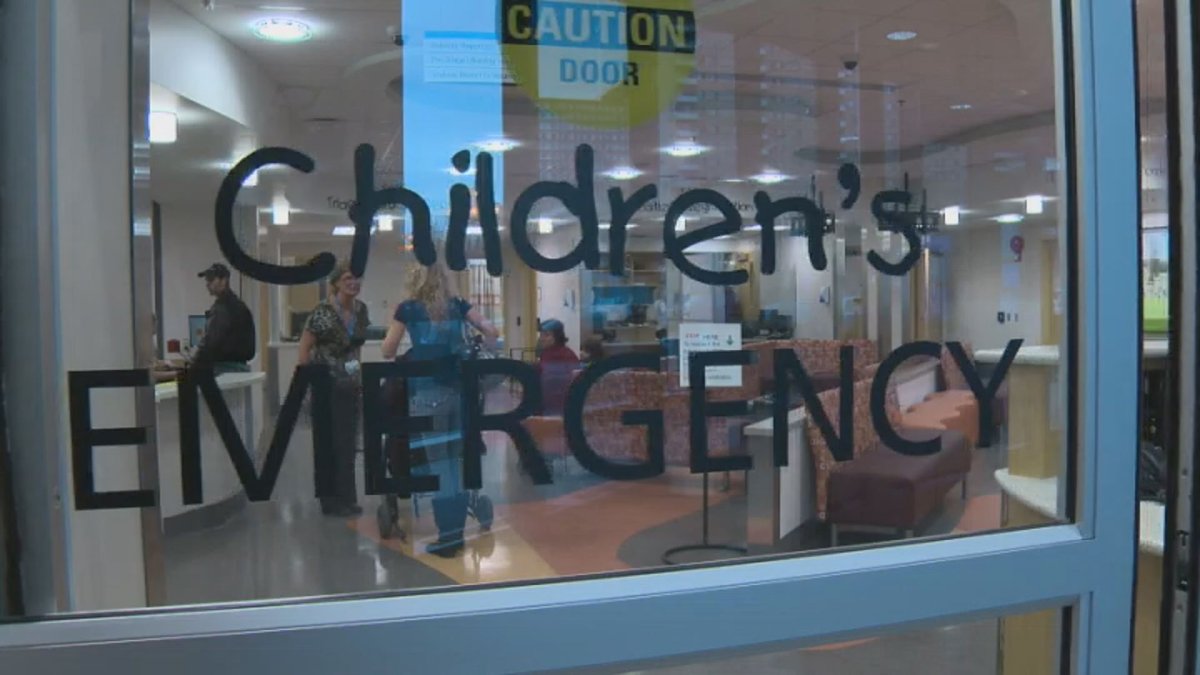The past eight months have been the worst in the ongoing COVID-19 pandemic when it comes to the number of kids going to Alberta hospitals with the coronavirus, according to provincial data collected by Global News.

At the end of 2021, a total of 103 infants under one year old had been to hospital because of COVID-19 since the pandemic began. By the end of August 2022, that number ballooned to 418. ICU admissions for the same age range jumped from 22 to 77 in that time.
For kids aged one to four and five to nine, a similar hospitalization trend has emerged – three times more kids admitted to hospital with COVID-19 in the first eight months of 2022 than in the entire 20 months prior.
All other age ranges tracked by provincial authorities have seen about a doubling of hospitalizations due to COVID-19 in 2022.
“The increase in hospitalizations in children in that age group have certainly been alarming and it’s been reflected in my personal (outpatient) experience,” Dr. Tehseen Ladha, an Edmonton pediatrician and pediatrics assistant professor at the University of Alberta, told Global News.
Ladha said most of the kids in her outpatient clinic have had COVID-19, with some landing in hospital.
Earlier in the pandemic, Ladha worked in the Stollery Children’s Hospital, She said she has had to refer child patients to intensive care. A universal sentiment among parents she’s spoken with is they never want to see their kids in hospital.
“It’s a terrible time,” Ladha said. “It’s terrible to have your child be so sick that they need to be hospitalized. It causes a lot of anxiety among families, legitimately of course. And it’s really difficult because the child often doesn’t understand what’s going on.
“The child is in a lot of stress from a physical perspective, as well as an emotional perspective. And, you know, watching your child get poked over and over and be subjected to different medical interventions in order to help them recover is really traumatic.”

Ladha pointed to a few possible reasons for the increase in COVID-19 hospitalizations: the lifting of public health measures like masking and isolation requirements, the increased transmissibility and community levels of Omicron and its subvariants over Delta and a lack of awareness with regard to vaccines for kids under 12.
“I’m finding under the age of 12, there is quite a bit of parental hesitation around vaccinating their kids against COVID. And the younger the child is, the more the hesitation around vaccinating for COVID,” Ladha said.

Get weekly health news
The pediatrician also noted there appears to be “very little” awareness of the availability of vaccines for children aged six months to five years old – doses that were made available on Aug. 2.
“When I see patients and families, I always inform them that it’s available, and in my experience, barely any have been aware that it’s been available.”
Ladha also noted accessing pediatric vaccines can be a challenge and she would like to see “efforts to meet families where they are.”
Alberta has the lowest vaccination rates for children among Canadian provinces, according to Public Health Agency of Canada data.
Only 51.1 per cent of kids aged five to 11 have received their first dose of a COVID-19 vaccine – originally approved in late November 2021 – and 37.5 per cent have completed a primary series of two doses.
Of kids aged one to four years old, 5.1 per cent have received a first dose. And only 1,047 infants between six and 11 months of age, or 4.1 per cent, have received a dose.

Pediatric doses of the COVID-19 vaccine have been shown to prevent severe disease and hospitalization – protections similar to adolescent and adult vaccines but with lower incidences of adverse reactions to the shots. And the Omicron-specific bivalent doses could help stem transmission of the Alberta-dominant BA.5 subvariant, Ladha said.
“If you’re going to take a risk on the vaccine versus getting COVID, I would certainly recommend taking the risk and getting the vaccine because that’s really minimally risky.”
Ladha, who also has a master’s degree in public health, doesn’t expect the high hospitalization rate for kids under 10 to wane anytime soon if vaccination rates for children remain low and other non-pharmaceutical interventions like masking and improved ventilation of indoor spaces aren’t used.
“Over the course of the pandemic, (there has been) a lot of minimizing of the effects of COVID on children,” she said. “And so when parents hear that, they feel that COVID itself is not a big risk to their children, and so it’s not necessary to immunize.”
Some children who have caught COVID-19 see knock-on effects like multisystem inflammatory syndrome in children (MIS-C), and Ladha has heard of increases in other viruses circulating after infection, possibly as a result of an impaired immune system.
But one post-infection syndrome has Ladha concerned, in light of apparently unabated spread of the novel coronavirus.
“We really don’t know in the long term whether children who get infected with COVID once, twice, multiple times will have disabilities in the long term,” she said. “And certainly I have seen teenagers or older children who have long COVID, that have been very limited in their functions, have been unable to attend school, participate in sports.
“And so that’s very much a novel area that we’re still learning about.”




Comments